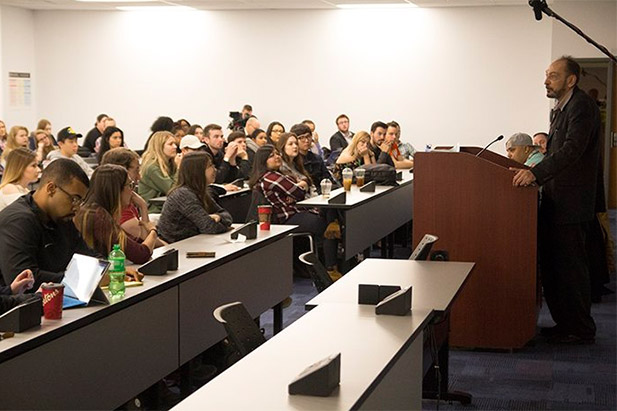Campus panel explores how to stop the root causes of hatred and violence
April 10, 2017

What do an ex-gang member, an ex-organized criminal, an ex-right wing extremist and a Muslim activist all have in common? A lot more than one might expect.
The University of Ontario Institute of Technology forum Reflections on Hate and Trauma brought together a group of speakers who have joined, led or interacted with violent social movements but were able to step away from their violent past and change their lives. The speakers shared stories, experiences and lessons with students in the Faculty of Social Science and Humanities (FSSH).
“We wanted to assemble a diverse group of people who have shared some similar pathways into and out of violent movements,” says Dr. Barbara Perry, Professor, FSSH. “We shared with our audience the optimistic message that there is life after experiences such as hate, violence, anger and marginalization.”
Dr. Perry and FSSH Lecturer Adam Ellis organized the event to connect course content with living, breathing examples of former adherents of violent movements within the community. The questions came from all angles and the answers quickly became personal, allowing the students a private window into the lives of the panelists.
While students came prepared with questions for the panelists, the participants’ own wide variety of backgrounds spawned questions between panelists.
Topics included:
- Recruitment methods in violent organizations.
- Intergenerational violence and its effects.
- The psychology behind violent movements.
- The connection between music and gang/criminal lifestyles (unifying, source of inspiration or hope, etc.).
- Reconciliation with past ideologies in present day.
Although panelists brought their own unique backgrounds, there were many similarities and commonalities in their stories.
“All of our problems started when we were in our early to mid-teens and struggling,” says panelist and ex-organized criminal Eddie Hertrich.
The panelists expressed unified optimism for ending the violent cycles within their own movements. They believe education is the first step.
“Hopefully, the more we educate ourselves as a population, the less it’ll be a problem,” says Hertrich.



